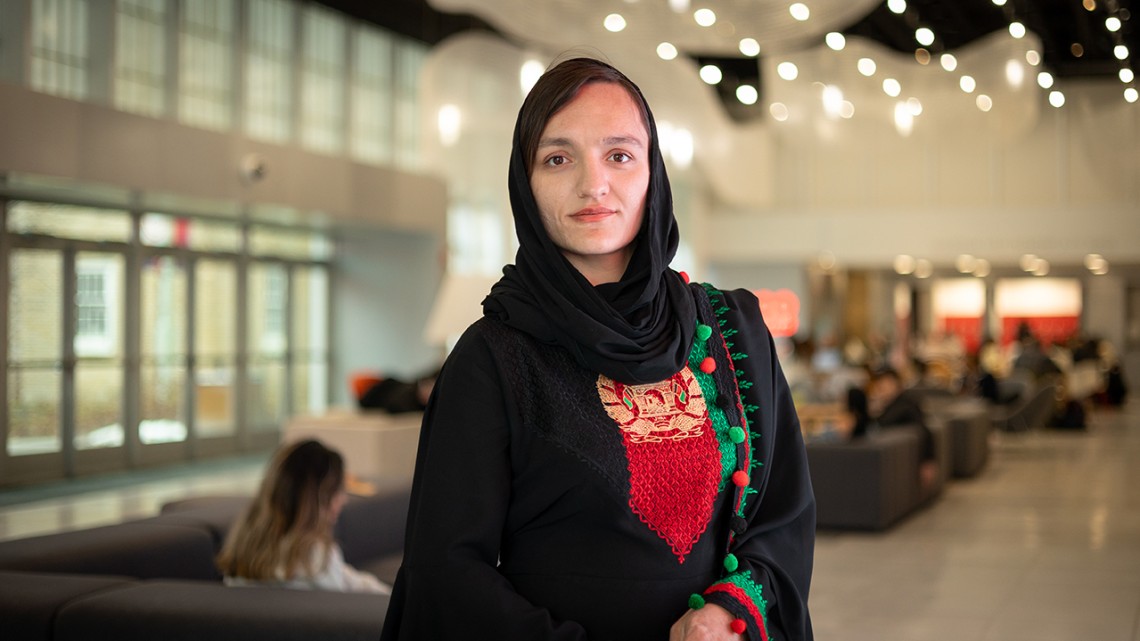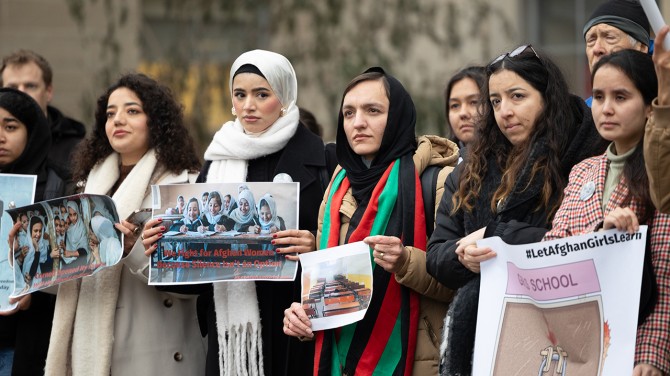
Zarifa Ghafari, now a master's student in the Cornell Jeb E. Brooks School of Public Policy, became a target of the Taliban when she served as one of Afghanistan's first female mayors.
Former Afghan mayor, now a student, advocates for girls and women
By Caitlin Hayes, Cornell Chronicle
Even before she took office in 2019, Zarifa Ghafari – the youngest and one of the only female mayors to serve in Afghanistan – became a target of the Taliban. She survived multiple assassination attempts, and in 2020, her father was fatally shot outside his home.
She fled the country with her family in August 2021, when the Taliban took control, and was heartbroken a month later, when she watched from Germany as the new regime banned secondary education for girls. She’s since dedicated her life to fighting for the rights of girls and women living under Taliban rule.
“The future of countless young girls was dismantled so abruptly, and years of hard-won progress appeared to vanish overnight,” said Ghafari, now a master’s student in the Cornell Jeb E. Brooks School of Public Policy. “My immediate reaction was a torrent of anger, deep sadness, a sense of profound injustice.”
Before becoming mayor of Maidan Shahr, the capital city in conservative Wardak Province, Ghafari established Assistance and Promotion for Afghan Women, an organization dedicated to uplifting Afghan women, and ran Peghla FM Radio, which broadcast information across Wardak Province about women’s rights, politics, economics and social development. Since leaving Afghanistan, she’s become a vocal human rights activist and advocate, working to raise awareness of the current plight of Afghan girls and women.
In 2019, she was included on the British Broadcasting Corporation’s list of 100 Inspiring and Influential Women and was honored in 2020 by the U.S. secretary of state as an International Woman of Courage. In 2022, she also published a memoir, “Zarifa: A Woman’s Battle in a Man’s World,” and was the focus of a 2022 Netflix documentary, “In Her Hands.”
“Zarifa’s story is one of commitment and determination in the face of great personal risk – and her advocacy on behalf of Afghan girls and women is the epitome of doing ‘the greatest good,’” said Interim President Michael I. Kotlikoff. “We’re honored to have her as part of the Cornell community.”
While the situation in Afghanistan has changed, Ghafari’s conviction about the importance of education for Afghan girls and women has not – and she plans to use her time in Ithaca and her Cornell degree to continue the fight.
“I’m here to learn more about policy-making and implementation,” she said. “Cornell also has a great network, and I want to raise awareness and get broader support for women in Afghanistan.”
With the Organization for Afghan Students, Ghafari participated in a rally on Dec. 9 and hopes to establish opportunities for Afghan girls and women at Cornell.
“We are very proud to have a global human rights leader like Zarifa as part of our Brooks School community,” said Thomas O’Toole, executive director of public affairs programming for the Brooks School. “We hope she will acquire tools that will support her advocacy and political work, and that she will become connected to a network of Cornellians who can fight by her side.”
Taking the risk
When Ghafari was 7 or 8, she noticed that she was being treated differently than her brothers – and she didn’t like it.
“There were restrictions around my life more and more, and I looked at myself and my brothers, and I didn’t understand. I was a human being with full humanity and so were they,” Ghafari said. “I thought, what’s the possible way to get out of this? And the answer was: I needed to be well-educated. That was the starting point.”
She attended primary and secondary school in Afghanistan, and then earned bachelor’s and master’s degrees in India. In 2018, back in Afghanistan, her fiancé (now husband) suggested she put her name in the running for mayor of Maidan Shahr – a city where women and girls are scarcely seen in the streets, never mind in public office.
“It wasn’t a clear decision for me when I started,” Ghafari said. “But as soon as my name was announced on the longlist, I felt there was a movement against me, and I felt that there was something I am able to do that no one else can do.”
Nine months of protests and threats followed Ghafari’s appointment and prevented her from even entering her office. Once installed, she endured constant threats, survived numerous assassination attempts and feared for her life, but she turned down offers from the central Afghan government for a safer position.
“I felt I needed to take the risk, to continue in the path of other women and break down barriers,” she said.
In November 2020, her father, an Afghan Army colonel, was assassinated by Taliban militants on the street outside the family home in Kabul. Ghafari grieved and questioned, but, with her mother’s encouragement, decided to stay on in her position.
“Even though my dad had trouble pushing back on the social norms around him, he was not a dark-minded person. He wanted me to grow, to shine,” Ghafari said. “And my mother told me to keep up my struggle.”
Even after the Taliban took control in 2021, Ghafari did not want to leave Afghanistan, but she did so for her family, especially her mother and four sisters. Now, Ghafari said she mourns, continuously, the Taliban’s swift reversal of the progress made by her and others. The most recent setback was in early December, when the Taliban banned medical training for women.
“This was the last hope for every girl,” Ghafari said. “I know women who were doctors, engineers, with big educational backgrounds who were enrolled in these institutions ... now they have nothing. It’s heartbreaking.”
Ghafari is part of a group of international leaders raising their voices and lobbying on behalf of Afghan girls and women while also collecting evidence of the gender apartheid emerging under the Taliban’s rule. Their advocacy has gotten the attention of the International Criminal Court, which may issue arrest warrants for Taliban leaders for their policies impacting women and girls.
At Cornell, Ghafari is using her coursework to create a firmer foundation for her activism, studying the impact of women’s education on global development and how policies in Afghanistan have impacted its trajectory.
“Coming from Afghanistan, with the situation there now, to studying here in this class – no one appreciates the privilege more, the contribution the class and the subjects could make to my work, to my country,” Ghafari said.
Media Contact
Get Cornell news delivered right to your inbox.
Subscribe

